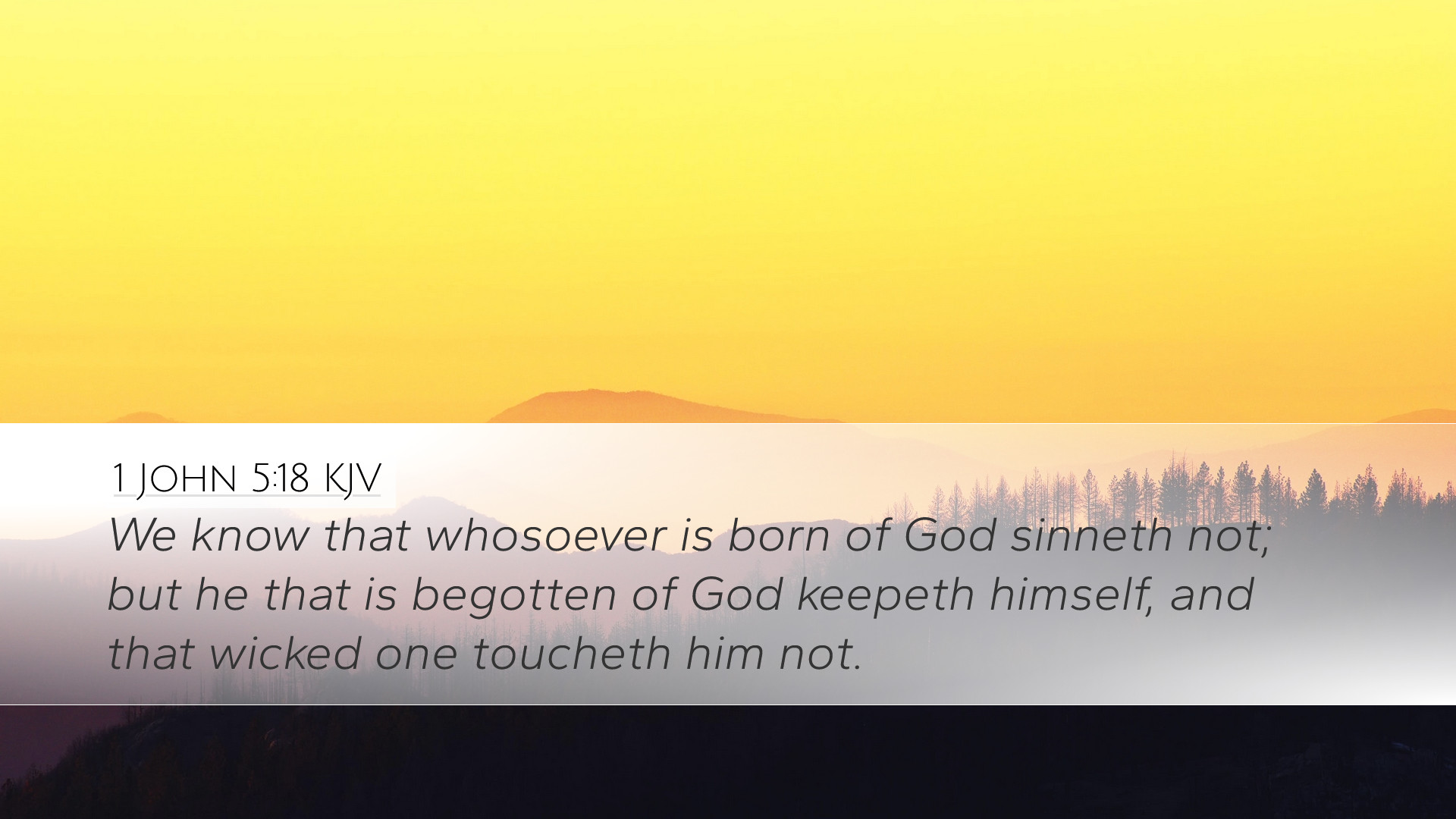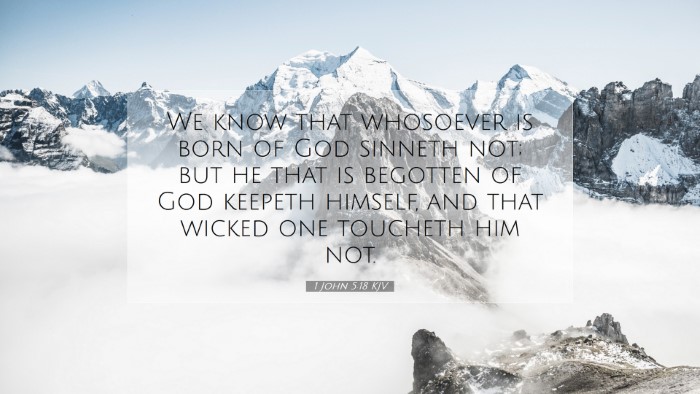Old Testament
Genesis Exodus Leviticus Numbers Deuteronomy Joshua Judges Ruth 1 Samuel 2 Samuel 1 Kings 2 Kings 1 Chronicles 2 Chronicles Ezra Nehemiah Esther Job Psalms Proverbs Ecclesiastes Song of Solomon Isaiah Jeremiah Lamentations Ezekiel Daniel Hosea Joel Amos Obadiah Jonah Micah Nahum Habakkuk Zephaniah Haggai Zechariah Malachi1 John 5:18
1 John 5:18 KJV
We know that whosoever is born of God sinneth not; but he that is begotten of God keepeth himself, and that wicked one toucheth him not.
1 John 5:18 Bible Commentary
Commentary on 1 John 5:18
Verse Text: "We know that whosoever is born of God sinneth not; but he that is begotten of God keepeth himself, and that wicked one toucheth him not."
Introduction
This verse serves as a culmination of the Apostle John's teachings on assurance of salvation and the believer's relationship with God. John speaks to a community struggling with issues of sin, assurance, and the nature of spiritual warfare. This commentary seeks to draw upon insights from various public domain sources, focusing on the key themes embedded in this profound scripture.
Exegesis of 1 John 5:18
Concept of Being Born of God
John’s declaration that "whosoever is born of God sinneth not" (1 John 5:18) emphasizes the transformative power of divine birth. Albert Barnes notes that this rebirth equips the believer with a new nature, one that is inclined towards godliness rather than sin. This reflects the theological concept of regeneration whereby believers, as new creations, start to exhibit characteristics of holiness.
Sin and the New Nature
Matthew Henry elaborates on the inherent conflict in the believer's life. While they may still commit acts of sin due to human frailty, their identity as children of God means they do not continue in an unbroken pattern of sin. The term "sinneth not" is further explored by Adam Clarke, who asserts that it points to the believer's habitual practice: they do not make sin their lifestyle.
Protection from the Wicked One
Divine Protection
John goes on to say that "he that is begotten of God keepeth himself, and that wicked one toucheth him not." Here, John provides assurance of spiritual protection. Matthew Henry interprets this as a declaration of God's safeguarding presence in the life of the believer. The act of keeping oneself can be understood as an active engagement in faith, holiness, and vigilance against temptation, aligning with 1 Peter 5:8, which calls for sobriety and vigilance against the adversary.
The Role of the Believer
Clarke elaborates that this “keeping” is both passive and active. On the one hand, it acknowledges God’s providential care; on the other hand, it insists on the believer’s responsibility to remain steadfast. Pastors and theologians should teach that while God protects, believers must also engage in maintaining their spiritual lives through prayer, study, and fellowship.
Theological Implications
The implications of this verse are profoundly theological. It affirms the reality of spiritual warfare, wherein the “wicked one,” often interpreted as Satan, cannot claim dominion over the offspring of God. Barnes emphasizes the blessed security provided to those who are truly God’s children, affirming that they rest in the assurance of His protective grace.
Living Out Victory
For pastors, this commentary invites them to encourage congregants not only to understand their position in Christ but to live out the victory over sin and demonic influence. The analogy of keeping oneself can be enriched by practical applications: accountability, confession, and reliance on the Holy Spirit.
Conclusion
In conclusion, 1 John 5:18 encapsulates a vital truth for believers: through the regenerative work of Christ, they are empowered to resist sin and are upheld by divine protection. This assurance can foster holistic spiritual growth and resilience in the face of adversity. For students and scholars, this verse serves as a cornerstone for discussions on sanctification, assurance, and the believer’s identity.
As scholars facilitate these discussions, they should integrate the teachings of early Church Fathers alongside classical Protestant commentaries to paint a comprehensive picture of this important text. The words of John offer both comfort and challenge; believers are called to live in the light of their new identity while resting in the assurance of God's unchanging protection.


